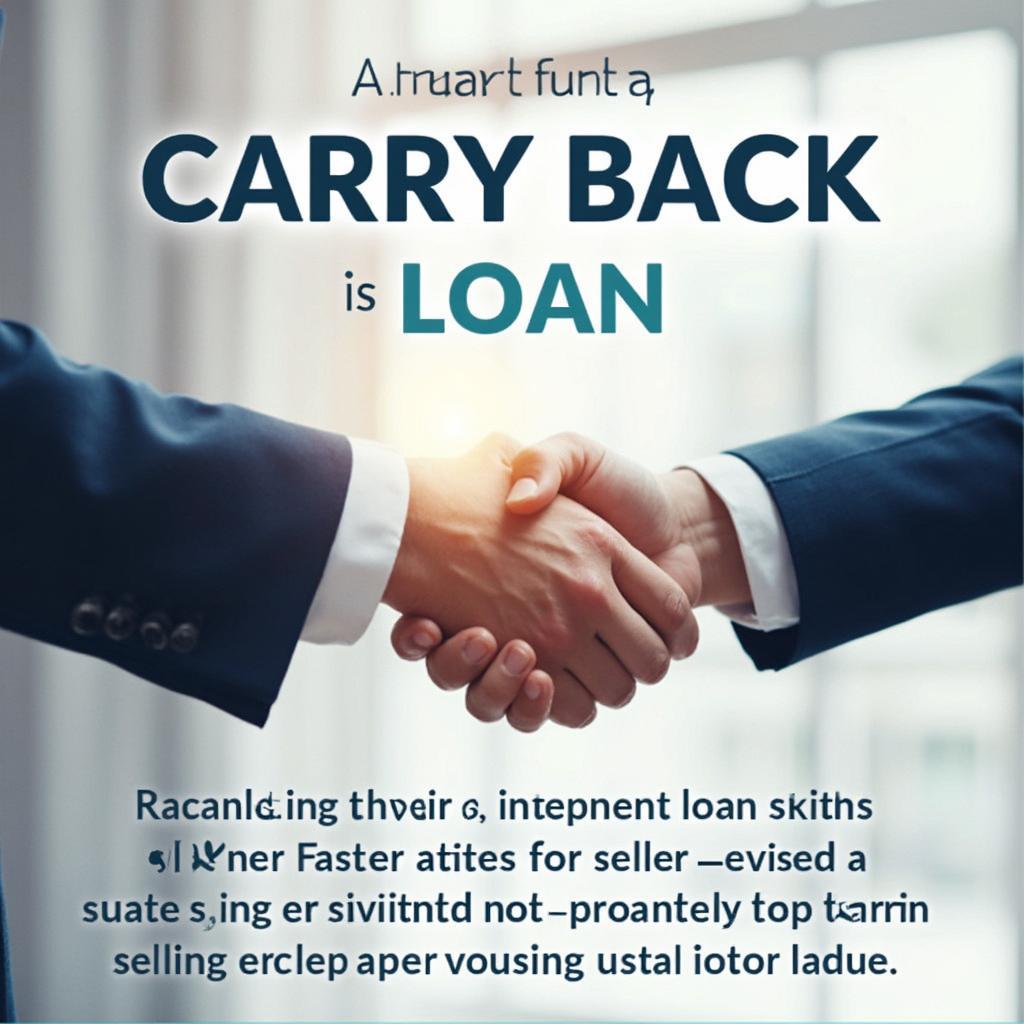
What is a Carry Back Loan?
A carry back loan is a unique financing arrangement where the seller of a property, often a business or real estate, becomes the lender to the buyer. This allows the buyer to purchase the property without securing traditional financing from a bank or other financial institution. The seller “carries back” a portion of the purchase price as a loan, effectively financing the sale themselves.
Similar to what is a carryback loan, seller financing can offer benefits to both parties involved, but it’s crucial to understand the intricacies before entering such an agreement. Let’s delve deeper into the mechanics, advantages, and disadvantages of carry back loans.
Understanding Carry Back Loans in Detail
Carry back loans, sometimes called seller financing or purchase-money mortgages, can be structured in various ways, but the core concept remains the same: the seller acts as the lender. This can be particularly appealing in situations where traditional financing is difficult to obtain, such as for unique properties or during periods of tight lending standards. The loan terms, including interest rate, repayment period, and down payment, are negotiated directly between the buyer and seller.
How Does a Carry Back Loan Work?
A carry back loan essentially replaces or supplements a traditional mortgage. The buyer makes regular payments to the seller, just as they would to a bank, until the loan is fully repaid. The seller holds a lien on the property until the loan is satisfied. This provides security for the seller, similar to a traditional mortgage.
Benefits of a Carry Back Loan for Buyers
For buyers, carry back loans can open doors to property ownership that might otherwise be inaccessible. They often require less stringent qualification criteria than traditional loans, potentially allowing individuals with less-than-perfect credit to purchase property.
- Easier Qualification: Less stringent credit requirements can be a significant advantage.
- Flexible Terms: Negotiable terms allow for customized loan agreements tailored to the buyer’s circumstances.
- Faster Closing: The absence of a third-party lender can expedite the closing process.
Benefits of a Carry Back Loan for Sellers
Sellers can also benefit from offering carry back financing. It can make their property more attractive to potential buyers, potentially leading to a quicker sale.
- Faster Sale: Seller financing can attract a wider pool of buyers.
- Higher Selling Price: The flexibility of a carry back loan can sometimes justify a higher selling price.
- Interest Income: The seller earns interest income on the loan, providing a potential stream of passive income.
“Carry back loans can be a win-win for both buyers and sellers,” says Nguyen Thi Lan Anh, Senior Financial Advisor at VietFinance Group. “They offer a flexible and potentially lucrative alternative to traditional financing options.”
 Benefits of Carry Back Loans for Sellers
Benefits of Carry Back Loans for Sellers
Risks of Carry Back Loans
While carry back loans offer advantages, both buyers and sellers should be aware of the potential risks involved.
Risks for Buyers
- Balloon Payments: Some carry back loans include balloon payments, requiring a large lump-sum payment at the end of the loan term.
- Higher Interest Rates: Interest rates on carry back loans can sometimes be higher than traditional mortgage rates.
- Due-on-Sale Clause: The seller may include a due-on-sale clause, requiring the full loan balance to be paid if the property is sold before the loan term is complete.
Risks for Sellers
- Default Risk: There is always a risk that the buyer will default on the loan.
- Property Maintenance: The seller retains some responsibility for the property’s condition until the loan is fully repaid.
- Legal Complexities: Seller financing can involve complex legal documentation and procedures.
“It’s crucial to carefully review the loan terms and consult with legal and financial professionals before entering into a carry back loan agreement,” advises Tran Van Minh, a seasoned real estate lawyer at LexViet Law Firm. “Understanding the potential risks is essential for both buyers and sellers.”
loans until payday are a completely different financing option with its own set of advantages and disadvantages.
When to Consider a Carry Back Loan
A carry back loan can be a viable option in specific scenarios, such as:
- Difficult to Finance Properties: Unique or specialized properties may be challenging to finance traditionally.
- Poor Credit History: Buyers with blemished credit histories may find it easier to secure seller financing.
- Motivated Sellers: Sellers eager to close a deal quickly may be willing to offer carry back financing.
Similar to unsecured loans canada bad credit, carry back loans can be helpful in situations where obtaining a loan through traditional methods can be challenging.
 Situations Where a Carry Back Loan is Suitable
Situations Where a Carry Back Loan is Suitable
Conclusion
Carry back loans offer a unique and flexible financing option for both buyers and sellers. While they can be beneficial in certain situations, it’s crucial to understand the potential risks and complexities involved. Carefully consider the terms, consult with professionals, and ensure the agreement aligns with your financial goals. Understanding what is a carry back loan thoroughly is the first step toward making an informed decision. Consider exploring other loan options like loans based on income not credit direct lender to see which best suits your needs.
loans zimbabwe is another area where similar financing options might be applicable.
FAQ
- What is the typical interest rate on a carry back loan? Interest rates are negotiable and can vary depending on market conditions and the specific agreement between the buyer and seller.
- How long does a carry back loan typically last? The loan term is also negotiable and can range from a few years to several decades.
- Are carry back loans recorded as liens against the property? Yes, similar to a traditional mortgage, a carry back loan is recorded as a lien, providing security for the seller.
- Can a buyer prepay a carry back loan? Prepayment terms are typically outlined in the loan agreement and may include penalties.
- What happens if the buyer defaults on a carry back loan? The seller has the right to foreclose on the property, similar to a traditional lender.
- Do I need a lawyer for a carry back loan? It’s highly recommended to consult with a real estate attorney to ensure the legality and protect your interests.
- Is a carry back loan a good idea? Whether or not a carry back loan is a good idea depends on the specific circumstances and the needs of both the buyer and seller. Careful consideration and professional advice are crucial.




